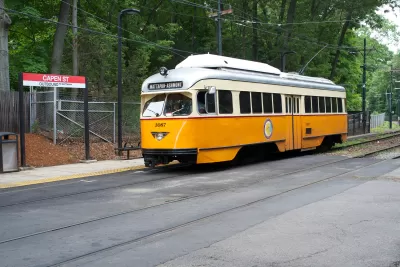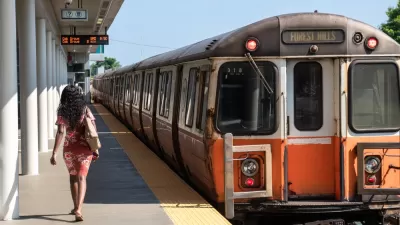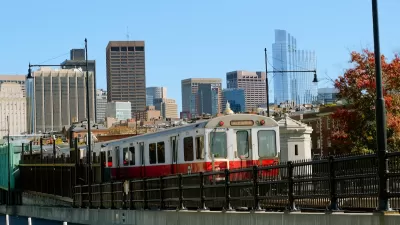The MBTA is considering the future of a unique service: the Mattapan high-speed trolley line. Upkeep costs are high, but replacing the track with buses might be a shortsighted move.

Its iconic rolling stock gives Boston's Ashmont-Mattapan line an ambiance right out of the golden age of American streetcars. But those classic trolleys may be the line's undoing. Recently, "the [MBTA] control board, charged with whipping the T's finances into shape, put the 2.5-mile Ashmont-to-Mattapan line on the chopping block because maintaining its fleet of ancient trolleys likely costs more than replacement buses would."
This editorial makes the case for updating, not stripping out, this distinctive transit resource. "Board members should give some thought to why New York, Salt Lake City, Washington, Portland, Tucson, and other US cities have committed to streetcar lines, despite what sometimes seem like unfavorable economics. What those cities have concluded is that streetcars make communities more attractive and liveable in ways that buses don't."
A refurbished Mattapan line could make its surroundings more valuable in a way buses never could. "It's hard to see how taking away the neighborhood's signature transit amenity would make the T's 2.5-acre parcel more valuable. If anything, by ending the trolley, the T could be shooting itself in the foot."
FULL STORY: Boston shouldn’t derail Mattapan trolley

Trump Administration Could Effectively End Housing Voucher Program
Federal officials are eyeing major cuts to the Section 8 program that helps millions of low-income households pay rent.

Planetizen Federal Action Tracker
A weekly monitor of how Trump’s orders and actions are impacting planners and planning in America.

The 120 Year Old Tiny Home Villages That Sheltered San Francisco’s Earthquake Refugees
More than a century ago, San Francisco mobilized to house thousands of residents displaced by the 1906 earthquake. Could their strategy offer a model for the present?

HSR Reaches Key Settlement in Northern California City
The state’s high-speed rail authority reached an agreement with Millbrae, a key city on the train’s proposed route to San Francisco.

Washington State Legislature Passes Parking Reform Bill
A bill that would limit parking requirements for new developments is headed to the governor’s desk.

Missouri Law Would Ban Protections for Housing Voucher Users
A state law seeks to overturn source-of-income discrimination bans passed by several Missouri cities.
Urban Design for Planners 1: Software Tools
This six-course series explores essential urban design concepts using open source software and equips planners with the tools they need to participate fully in the urban design process.
Planning for Universal Design
Learn the tools for implementing Universal Design in planning regulations.
Ada County Highway District
Clanton & Associates, Inc.
Jessamine County Fiscal Court
Institute for Housing and Urban Development Studies (IHS)
City of Grandview
Harvard GSD Executive Education
Toledo-Lucas County Plan Commissions
Salt Lake City
NYU Wagner Graduate School of Public Service





























